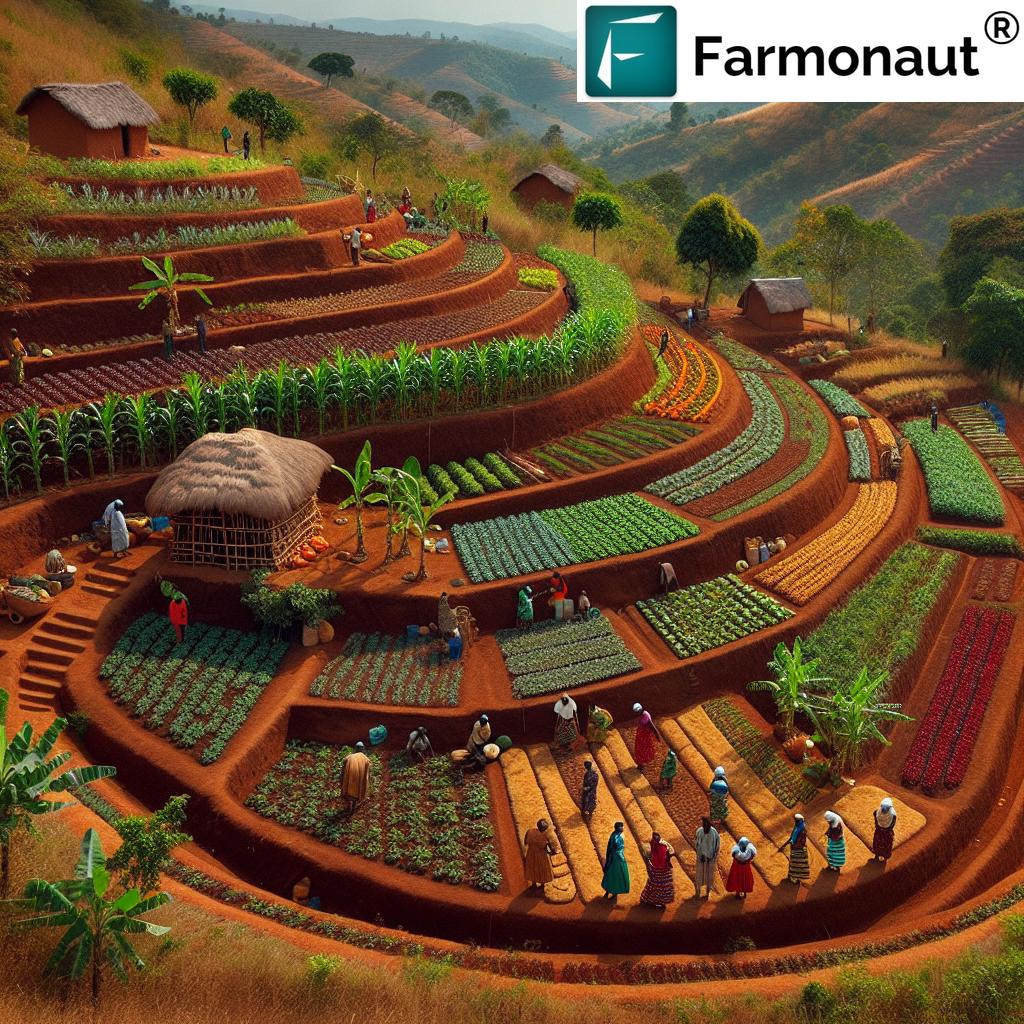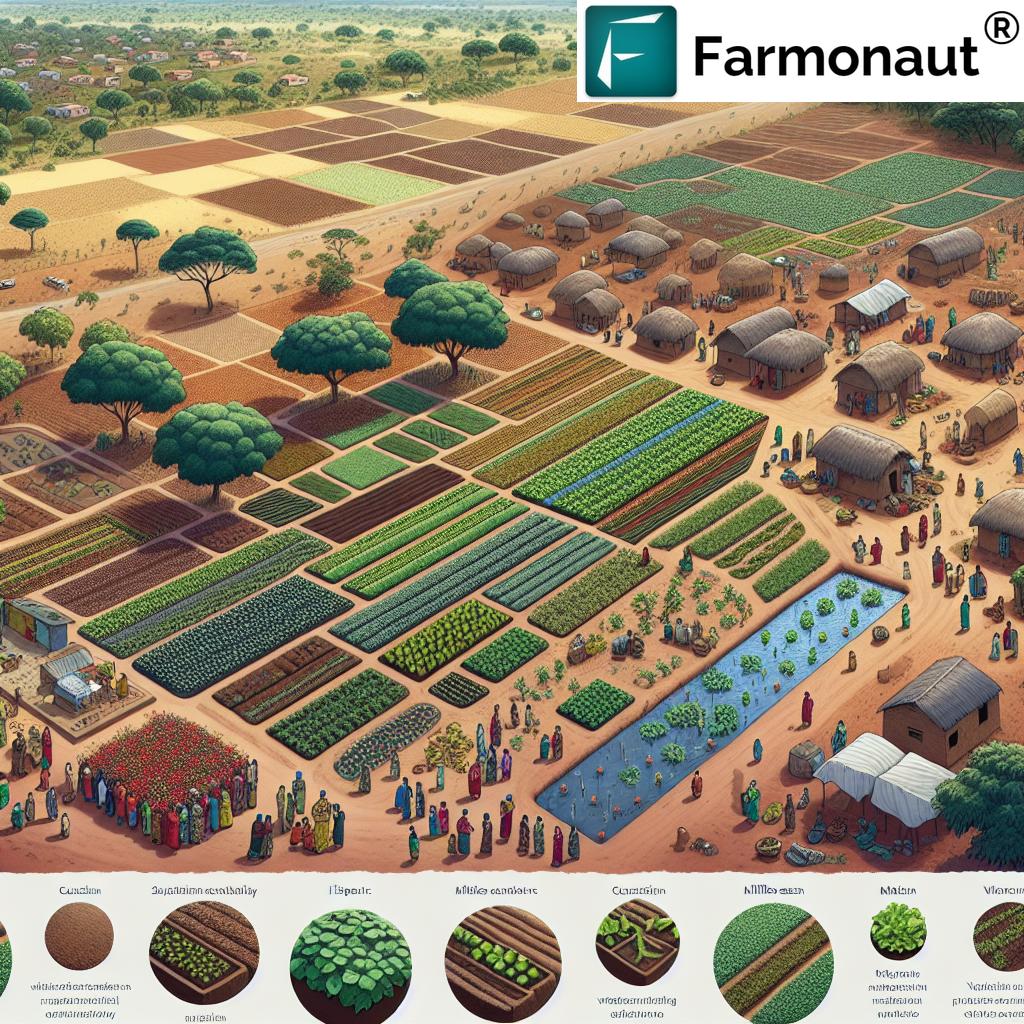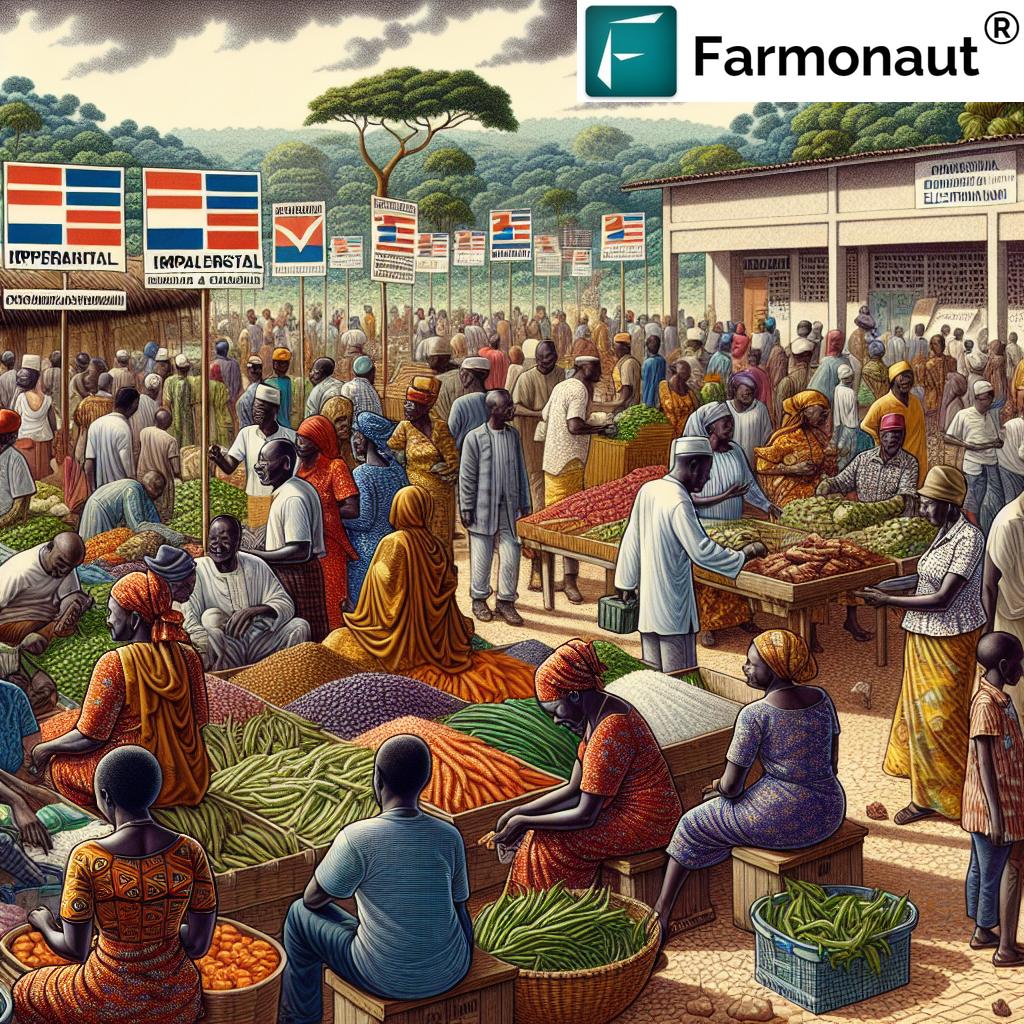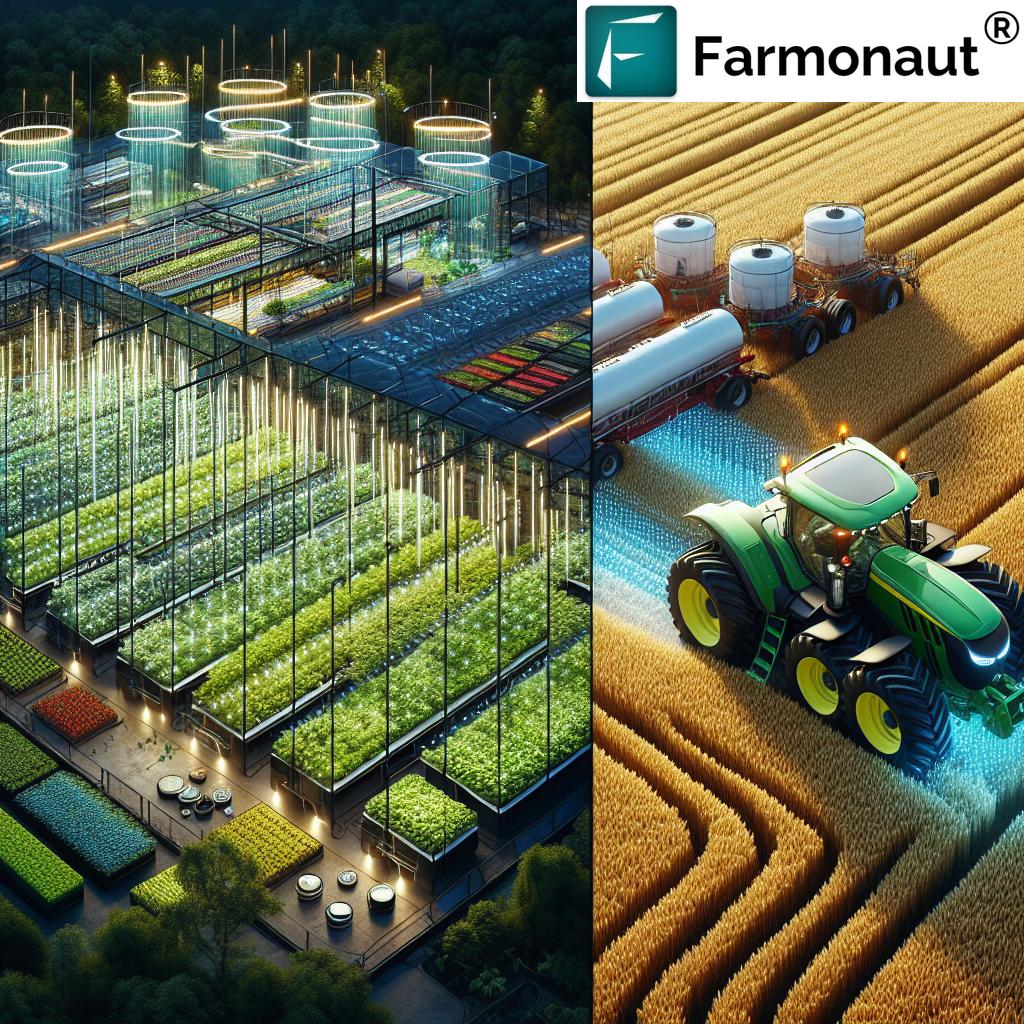Transforming Malawi’s Agriculture: Sustainable Farming Practices Empower Rural Communities in Rumphi, Karonga, and Mzimba
“Farmonaut’s sustainable farming initiative in northern Malawi empowers 6,000 vulnerable individuals with climate-resilient agriculture techniques.”
In the heart of northern Malawi, a remarkable transformation is taking place. We’re witnessing the dawn of a new era in rural agricultural development, where sustainable farming practices are not just a concept but a tangible reality. This innovative initiative, supported by cutting-edge technology from Farmonaut, is breathing new life into the communities of Rumphi, Karonga, and Mzimba districts. As we delve into this inspiring journey, we’ll explore how these climate-resilient agriculture techniques are empowering vulnerable individuals and reshaping the landscape of Malawi’s agricultural sector.
The Power of Sustainable Farming Practices in Northern Malawi
In recent years, the agricultural landscape of northern Malawi has been facing numerous challenges. Climate change, soil degradation, and economic hardships have tested the resilience of rural communities. However, the introduction of sustainable farming practices is offering a beacon of hope. These methods are not just improving crop yields; they’re transforming lives and fostering a sense of empowerment among farmers.
The Small Producers Development and Transporters Association (SPRODETA), with crucial funding from DANIDA and Norwegian Church Aid, has embarked on an ambitious project. Their goal? To equip 6,000 vulnerable individuals with the knowledge and tools necessary for climate-resilient agriculture. This initiative is more than just an agricultural project; it’s a movement towards sustainable development and poverty alleviation through agriculture.

Agroecological Techniques: The Foundation of Change
At the core of this transformative initiative are agroecological techniques. These methods are revolutionizing the way farmers in Rumphi, Karonga, and Mzimba approach agriculture. By embracing these environmentally friendly farming methods, participants are not only increasing their yields but also contributing to the long-term health of their land.
- Soil Conservation: One of the primary focuses is combating soil erosion, a critical issue in the region. Through strategic tree plantings and the implementation of contour farming, farmers are effectively reducing soil loss and improving water retention.
- Crop Diversification: Farmers are encouraged to grow a variety of crops, moving away from monoculture. This practice not only improves soil health but also provides a buffer against crop failures and market fluctuations.
- Natural Pest Control: The use of chemical pesticides is being reduced in favor of natural pest control methods. This includes companion planting and the use of beneficial insects, promoting a healthier ecosystem within the farms.
These agroecological practices are not just theoretical concepts; they’re being actively implemented and yielding tangible results. Farmers are reporting improved soil quality, increased biodiversity on their lands, and more resilient crops in the face of changing climate conditions.
Combating Soil Erosion: A Tree at a Time
“The project introduces agroecological methods, combating soil erosion through tree plantings in Rumphi, Karonga, and Mzimba districts of Malawi.”
One of the most visually striking aspects of this initiative is the widespread tree planting effort across Rumphi, Karonga, and Mzimba. This isn’t just about adding greenery to the landscape; it’s a strategic move to combat soil erosion, a critical issue plaguing many farms in the region.
- Strategic Placement: Trees are being planted along contour lines and in areas prone to erosion. This strategic placement helps to stabilize the soil and reduce the impact of heavy rains.
- Multipurpose Benefits: The trees serve multiple purposes. While their primary role is soil conservation, they also provide shade, act as windbreaks, and in some cases, offer additional income through fruit or timber production.
- Indigenous Species: Emphasis is placed on planting indigenous tree species that are well-adapted to the local climate and beneficial to the native ecosystem.
The impact of these tree plantings goes beyond soil conservation. They’re creating microclimates that benefit crops, improving water retention in the soil, and contributing to the overall health of the local ecosystem. It’s a prime example of how sustainable farming practices can work in harmony with nature to produce positive outcomes for both farmers and the environment.
Fruit Orchards: Diversifying Income and Nutrition
The introduction of fruit orchards is another key component of the sustainable farming practices being implemented in northern Malawi. This initiative is not just about growing fruits; it’s about creating sustainable food production systems that provide both nutritional and economic benefits to the farmers.
- Variety of Fruits: Farmers are being encouraged to grow a diverse range of fruits suitable for the local climate. This includes mangoes, citrus fruits, and other indigenous varieties.
- Intercropping: The fruit trees are often intercropped with other plants, maximizing land use and creating synergistic growing environments.
- Long-term Investment: While fruit trees take time to mature, they represent a long-term investment in the farm’s productivity and the farmer’s income potential.
The fruit orchards are more than just a source of food; they’re a gateway to improved nutrition for families and a potential source of additional income through the sale of surplus produce. This diversification is crucial in building resilience against crop failures and market fluctuations.
Goat Husbandry: A Sustainable Livestock Solution
Integrating livestock into sustainable farming practices is a crucial aspect of this initiative, and goat husbandry has emerged as a particularly effective solution. Goats are well-suited to the climate of northern Malawi and offer numerous benefits to farmers.
- Low Input, High Output: Goats require relatively little in terms of feed and care but provide valuable outputs in the form of meat, milk, and manure.
- Soil Fertility: Goat manure is an excellent organic fertilizer, contributing to the overall health of the soil and reducing dependence on chemical fertilizers.
- Economic Resilience: Goats serve as a form of living savings, providing farmers with a safety net in times of crop failure or financial hardship.
The introduction of goat husbandry is helping to create more integrated and resilient farming systems. It’s a prime example of how sustainable farming practices can encompass both crop and livestock production, creating a more holistic approach to agriculture.

Eco-friendly Fertilizers: Nourishing the Soil Sustainably
A cornerstone of the sustainable farming practices being implemented in Rumphi, Karonga, and Mzimba is the use of eco-friendly fertilizers. This shift away from chemical-intensive farming is not only better for the environment but also more sustainable in the long term.
- Compost Production: Farmers are being trained in effective composting techniques, turning farm waste into valuable organic fertilizer.
- Green Manures: The use of nitrogen-fixing cover crops is being promoted as a natural way to enrich the soil.
- Integrated Nutrient Management: Farmers are learning to combine organic and inorganic fertilizers judiciously, optimizing soil health while minimizing environmental impact.
The adoption of these eco-friendly fertilization techniques is leading to healthier soils, reduced input costs for farmers, and more sustainable agricultural practices overall. It’s a key component in the transition towards more environmentally friendly farming methods in northern Malawi.
Economic Empowerment Through Village Savings and Loan Associations
The sustainable farming practices initiative in northern Malawi goes beyond agricultural techniques. It recognizes that true empowerment requires economic resilience. This is where village savings and loan associations (VSLAs) come into play, forming a crucial part of the holistic approach to rural development.
- Community-Based Finance: VSLAs provide a platform for community members to save money and access small loans.
- Financial Literacy: Participants receive training in basic financial management, empowering them to make informed decisions about their finances.
- Investment in Agriculture: Many farmers use the loans to invest in their farms, purchasing seeds, equipment, or livestock.
These associations are playing a vital role in fostering economic empowerment within the communities. They’re providing a safety net for farmers, allowing them to invest in their farms and manage financial risks more effectively. The reported distribution of K9 million to participants this year is a testament to the success and impact of these VSLAs.
The Role of Technology in Sustainable Farming
In the era of digital agriculture, technology plays a crucial role in implementing and scaling sustainable farming practices. This is where Farmonaut’s innovative solutions come into play, offering farmers in northern Malawi access to cutting-edge agricultural technology.
- Satellite-Based Crop Monitoring: Farmonaut’s satellite imagery technology allows farmers to monitor their crops’ health remotely, enabling timely interventions and optimized resource use.
- AI-Powered Advisory: The Jeevn AI system provides personalized farming advice, helping farmers make informed decisions based on real-time data and expert knowledge.
- Weather Forecasting: Access to accurate weather forecasts helps farmers plan their activities more effectively, crucial in the face of changing climate patterns.
By integrating these technological solutions with traditional farming knowledge, the project is creating a powerful synergy that enhances the effectiveness of sustainable farming practices. It’s a prime example of how modern technology can support and amplify the impact of agroecological methods.
Explore Farmonaut’s revolutionary agricultural solutions:
Impact on Food Security and Nutrition
The implementation of sustainable farming practices in Rumphi, Karonga, and Mzimba is having a profound impact on food security and nutrition in these communities. By diversifying crops, improving soil health, and increasing overall farm productivity, families are seeing tangible improvements in their food situation.
- Increased Crop Yields: The adoption of agroecological methods is leading to higher and more consistent crop yields, ensuring a more stable food supply.
- Dietary Diversity: The introduction of fruit orchards and vegetable gardens is improving the nutritional quality of diets in the community.
- Surplus Production: Many farmers are now able to produce surplus food, which can be sold to generate additional income.
This improvement in food security is not just about having enough to eat; it’s about having access to nutritious, diverse foods that contribute to overall health and well-being. It’s a clear demonstration of how sustainable farming practices can address both the quantity and quality aspects of food security.
Environmental Conservation and Climate Resilience
One of the most significant outcomes of this initiative is its positive impact on the environment. The sustainable farming practices being implemented are not only benefiting the farmers but are also contributing to broader environmental conservation efforts.
- Reduced Chemical Use: The shift towards eco-friendly fertilizers and natural pest control methods is reducing the environmental impact of farming activities.
- Improved Biodiversity: The diverse farming systems being promoted are creating habitats for a wide range of plant and animal species.
- Carbon Sequestration: Tree planting and improved soil management practices are helping to sequester carbon, contributing to climate change mitigation efforts.
Moreover, these practices are enhancing the resilience of farms to climate change impacts. By improving soil health, water retention, and crop diversity, farmers are better equipped to handle extreme weather events and changing climate patterns.
Scaling Up: The Future of Sustainable Agriculture in Malawi
As we look to the future, the success of this initiative in Rumphi, Karonga, and Mzimba presents an exciting opportunity for scaling up sustainable farming practices across Malawi. The lessons learned and the techniques developed here have the potential to transform agriculture on a national scale.
- Knowledge Sharing: Establishing networks for farmers to share their experiences and best practices with others across the country.
- Policy Advocacy: Using the success of this project to advocate for policies that support sustainable agriculture at the national level.
- Technology Integration: Expanding the use of technologies like those offered by Farmonaut to more farmers across Malawi.
The potential for scaling up these sustainable farming practices is immense. It offers a path towards a more resilient, productive, and environmentally friendly agricultural sector for Malawi.
Sustainable Farming Practices Impact in Northern Malawi
| Farming Practice | Implementation Area | Estimated Beneficiaries | Environmental Impact |
|---|---|---|---|
| Agroecological Methods | Rumphi, Karonga, Mzimba | 6,000 | Improved soil health, reduced chemical use |
| Tree Planting | All districts | 4,500 | Soil erosion prevention, carbon sequestration |
| Fruit Orchards | Selected farms in all districts | 3,000 | Increased biodiversity, improved nutrition |
| Goat Husbandry | Rumphi, Mzimba | 2,000 | Natural fertilizer production, income diversification |
| Eco-friendly Fertilizers | All districts | 5,500 | Reduced water pollution, enhanced soil microbiome |
FAQs
Q: What are the main sustainable farming practices being implemented in northern Malawi?
A: The main practices include agroecological methods, tree planting for soil erosion prevention, fruit orchards, goat husbandry, and the use of eco-friendly fertilizers.
Q: How many people are benefiting from this sustainable farming initiative?
A: The initiative is empowering 6,000 vulnerable individuals across the Rumphi, Karonga, and Mzimba districts.
Q: What role does technology play in this sustainable farming project?
A: Technology, particularly Farmonaut’s satellite-based solutions, plays a crucial role in crop monitoring, providing AI-powered advisory services, and weather forecasting to support farmers in making informed decisions.
Q: How are these sustainable practices impacting food security in the region?
A: The practices are leading to increased crop yields, greater dietary diversity, and surplus production, all of which contribute to improved food security and nutrition in the communities.
Q: What economic benefits are farmers experiencing from these sustainable practices?
A: Farmers are seeing reduced input costs, increased yields, and additional income streams through diversified production. The village savings and loan associations are also providing financial empowerment.
Conclusion
The transformation of agriculture in Rumphi, Karonga, and Mzimba through sustainable farming practices is a testament to the power of community-centered development strategies. By embracing agroecological methods, leveraging technology, and focusing on both environmental and economic sustainability, this initiative is paving the way for a resilient and prosperous agricultural future in Malawi.
As we’ve seen, the impact extends far beyond increased crop yields. It’s about empowering communities, conserving the environment, and building a sustainable food system that can withstand the challenges of climate change. The success stories emerging from this project offer valuable insights and hope for similar initiatives across Africa and beyond.
The journey towards sustainable agriculture in Malawi is ongoing, but the progress made in Rumphi, Karonga, and Mzimba is undeniably inspiring. It shows that with the right approach, support, and technologies, transformative change is possible. As this initiative continues to grow and evolve, it stands as a shining example of how sustainable farming practices can truly empower rural communities and shape a better future for all.
Explore Farmonaut’s API for agricultural data integration:
Farmonaut API
API Developer Docs
















